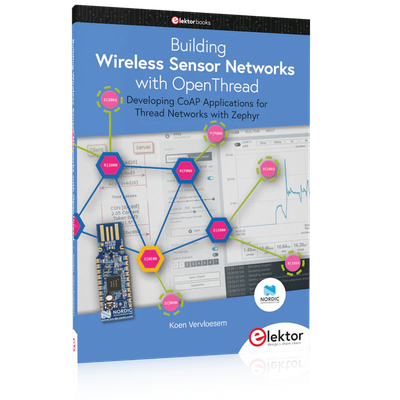Building Wireless Sensor Networks with OpenThread: Developing CoAP Applications for Thread Networks with Zephyr
This book will guide you through the operation of Thread, the setup of a Thread network, and the creation of your own Zephyr-based OpenThread applications to use it. You’ll acquire knowledge on:
The capture of network packets on Thread networks using Wireshark and the nRF Sniffer for 802.15.4.
Network simulation with the OpenThread Network Simulator.
Connecting a Thread network to a non-Thread network using a Thread Border Router.
The basics of Thread networking, including device roles and types, as well as the diverse types of unicast and multicast IPv6 addresses used in a Thread network.
The mechanisms behind network discovery, DNS queries, NAT64, and multicast addresses.
The process of joining a Thread network using network commissioning.
CoAP servers and clients and their OpenThread API.
Service registration and discovery.
Securing CoAP messages with DTLS, using a pre-shared key or X.509 certificates.
Investigating and optimizing a Thread device’s power consumption.
Once you‘ve set up a Thread network with some devices and tried connecting and disconnecting them, you’ll have gained a good insight into the functionality of a Thread network, including its self-healing capabilities. After you’ve experimented with all code examples in this book, you’ll also have gained useful programming experience using the OpenThread API and CoAP.
Title |
Building Wireless Sensor Networks with OpenThread: Developing CoAP Applications for Thread Networks with Zephyr |
Author |
Koen Vervloesem |
Publication date |
2024-05-02 |
Number of pages |
256 |
ISBN-13 |
978-3-89576-618-3 |
Publisher |
Elektor International Media (EIM) |
You can order the book in the Elektor Store or in your favourite book store.
The code examples from the book are available in the corresponding GitHub repository and are released under the open-source MIT and Apache 2.0 licenses. You can also find the errata list there and a list of additional tips and interesting projects not mentioned in the book.
